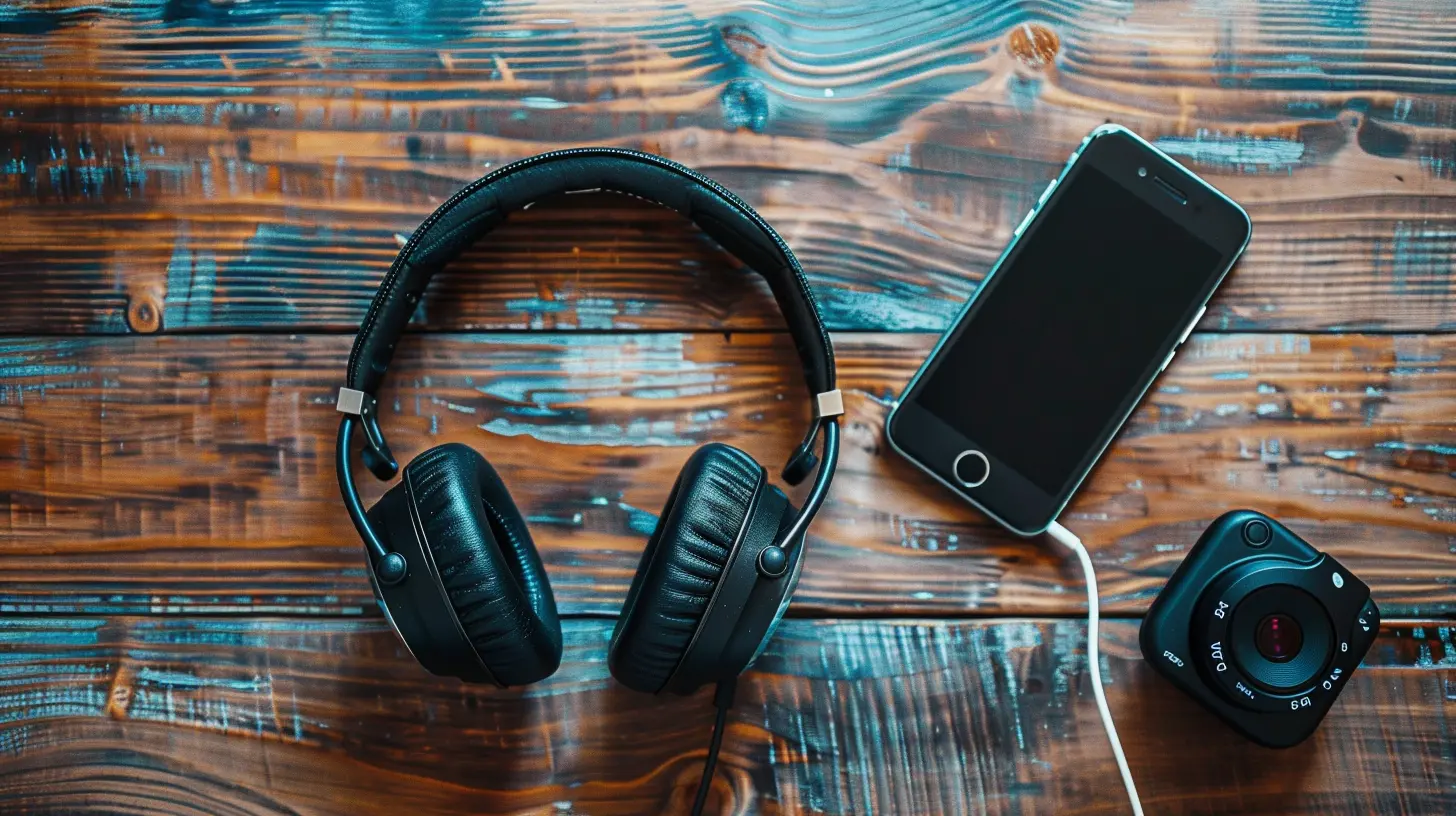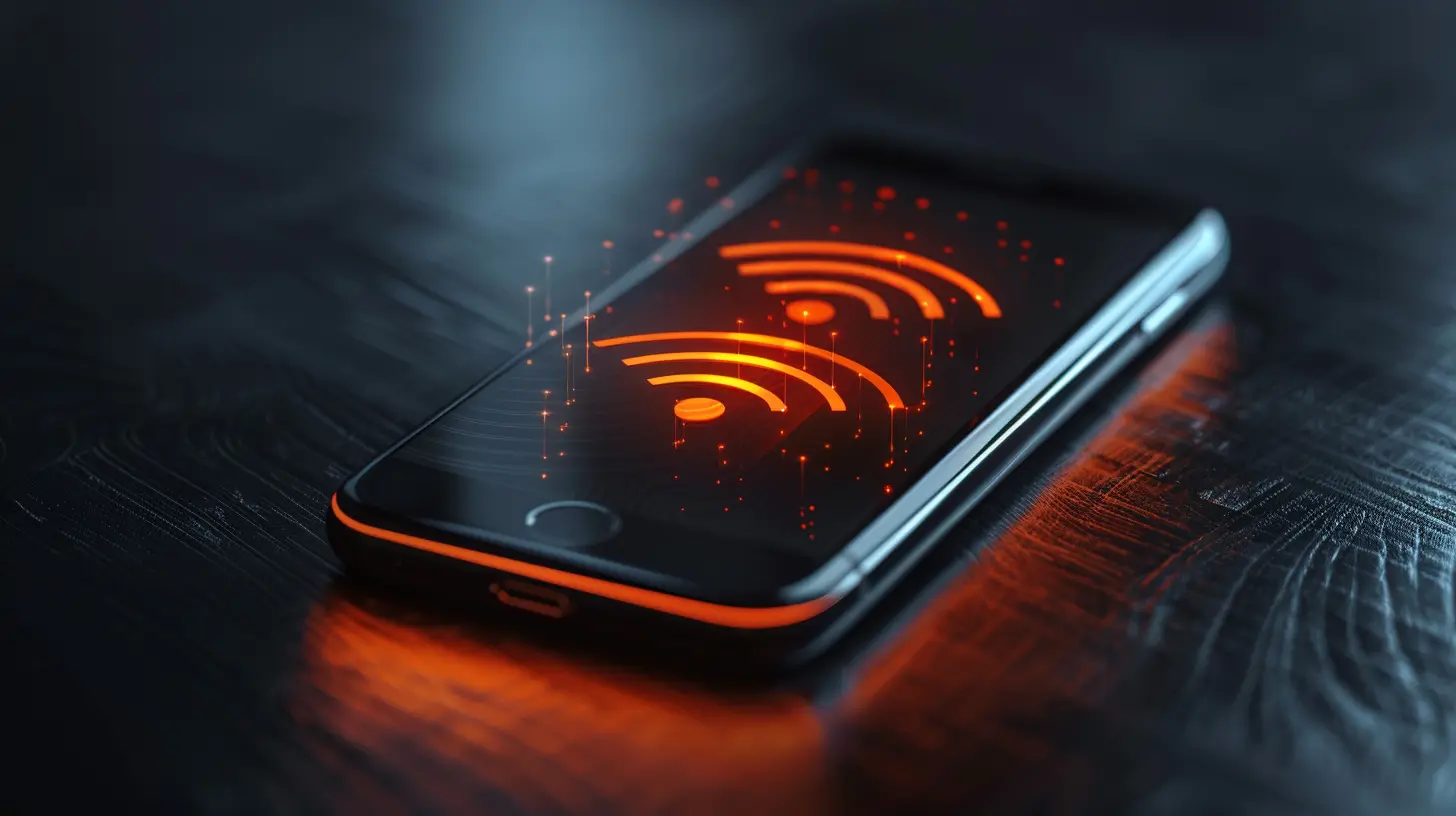Is Your Phone Listening? How to Manage App Permissions
1 December 2024
Have you ever had one of those eerie moments when you're talking about something with a friend, and then, out of nowhere, you see an ad pop up on your phone for that exact thing? It’s as if your phone was eavesdropping on your conversation, right? You're not alone in thinking this! Many people have questioned whether their smartphones are secretly listening to them. While the idea of our devices spying on us sounds like something straight out of a sci-fi thriller, there’s a more grounded and technical explanation behind it.
In this article, we’ll dive into whether your phone is really listening to your conversations and, more importantly, how you can manage your app permissions to protect your privacy. Buckle up because we’re about to demystify this tech paranoia!

Is Your Phone Really Listening to You?
The Short Answer: Kind of, But Probably Not
Is your phone “listening” to you? In most cases, no, it's not actively eavesdropping on your conversations. However, apps can and do collect a lot of data, including microphone access, but it’s rarely for the nefarious purpose of spying on your private conversations.Most of the time, the ads you see that feel eerily specific aren’t the result of your device listening to your voice but rather the outcome of highly sophisticated data collection systems. These systems analyze your search history, location, social media activity, and even your shopping habits to serve you ads that seem relevant to what's on your mind.
That said, some apps can access your microphone, meaning they could listen in under the right conditions. But is that really happening? Let’s break it down further.

How Apps Collect Data Without Listening
Data Based on Your Activity
Apps and websites know a lot about you, and they don’t need to listen to your conversations to do so. They collect data from:- Your browsing history
- Your location
- Your search queries
- Your social media interactions
- Online purchases and shopping habits
This data paints a vivid picture of who you are, what your preferences are, and what you might be interested in next. Advertisers use this information to create hyper-targeted ads that can feel like they’re reading your mind. But, in reality, they’re just really good at connecting the dots.
Contextual Triggers
Have you ever Googled something and then started seeing ads related to that thing for days? That’s called contextual marketing. Advertisers use your online activities to show you ads that are relevant to your recent searches.Sometimes, the timing of these ads might coincide with something you were just talking about, making it feel like your phone is listening, but it’s really just a coincidence based on the data you’ve provided through searches, apps, and other online activities.

How to Check If Apps Are Listening
So, what about the apps that do have access to your microphone? Could they be listening in secretly? While it’s unlikely that mainstream apps are engaging in this behavior (because of the heavy legal and reputational risks), it’s still essential to know which apps have access to your microphone, camera, and other sensitive permissions.How to Check App Permissions on iPhone
1. Go to Settings.2. Scroll down and select Privacy & Security.
3. Tap on Microphone.
4. Here, you’ll see a list of apps that have requested access to your microphone. You can toggle off any apps you don’t want to grant access to.
You can follow similar steps to check for camera, location, and other sensitive permissions.
How to Check App Permissions on Android
1. Open Settings.2. Go to Privacy.
3. Select Permission Manager.
4. Tap on Microphone (or Camera, Location, etc.).
5. You’ll see a list of apps that have microphone access. Again, you can disable permissions for any suspicious apps.

Why App Permissions Matter
The Importance of Controlling Access
App permissions might seem like a small thing, but they can have a big impact on your privacy. When you install an app, it often requests access to various features on your phone — such as your camera, microphone, contacts, or location. Some of these permissions are necessary for the app to function properly. For example, a video-calling app needs access to your camera and microphone, while a maps app requires access to your location.Other times, apps request access to features they don’t really need, and this is where things can get dicey. The more access an app has, the more data it can potentially collect about you. If you’re not careful, you might end up giving away more information than you intended.
Common Permissions You Should Watch For
Some of the permissions that apps commonly request include:- Microphone: Allows the app to listen to audio from your phone's microphone.
- Camera: Gives the app the ability to take photos or record video.
- Location: Allows the app to track where you are.
- Contacts: Gives the app access to your phone's contact list.
- Storage: Lets the app read and write files to your phone's internal or external storage.
While most apps don’t misuse these permissions, it’s still a good idea to limit access to only the apps that really need it.
How to Manage App Permissions (and Protect Your Privacy)
Regular Permission Audits
One of the best ways to protect your privacy is by conducting regular audits of your app permissions. This means going through your apps and checking which permissions they have been granted. If you notice that an app has access to something it shouldn’t (like a flashlight app having access to your contacts), it’s time to revoke that permission.Use Permission Prompts Wisely
When you install a new app, it will often ask for a series of permissions. Take your time and read through these requests carefully. If an app is asking for access to something that doesn’t make sense, deny the request. Many apps will still function perfectly fine even if they don’t have access to all the features they’re asking for.Limit Background Data Collection
Many apps collect data in the background, even when you’re not using them. You can limit this by disabling background data collection in your phone’s settings. For example:- On iPhone: Go to Settings > General > Background App Refresh and toggle it off for apps that don’t need to update in the background.
- On Android: Go to Settings > Data Usage > Background Data and disable it for specific apps.
Use Privacy-Focused Apps
If privacy is a big concern for you, consider switching to apps that prioritize user privacy. For example, instead of using Google Chrome, you might try DuckDuckGo, which doesn’t track your online activities. Similarly, messaging apps like Signal offer end-to-end encryption for enhanced privacy.Update Your Apps and OS Regularly
Keeping your apps and operating system up to date is crucial for maintaining your privacy. Developers frequently release updates that patch security vulnerabilities, and failing to install these updates can leave your phone exposed to privacy risks.
The Future of Privacy: More Control for Users
The good news is that privacy concerns have not gone unnoticed. Both Apple and Google have introduced new privacy features in their operating systems, giving users more control over their data.For example, starting with iOS 14, Apple introduced a feature that displays a small orange or green indicator in the status bar when an app is using your microphone or camera. On Android, Google has rolled out Privacy Dashboard, which provides a detailed overview of the permissions that apps have accessed in the past 24 hours.
These features make it easier than ever for users to take control of their privacy and keep an eye on what apps are doing behind the scenes.
Conclusion: Take Control of Your Digital Life
So, is your phone listening to your conversations? Probably not in the way you think. While it’s easy to jump to conclusions when a perfectly timed ad pops up, the reality is that most of the data collection happening on your phone is based on your online activity, not your spoken words.That being said, it’s crucial to stay vigilant and manage your app permissions to protect your privacy. By conducting regular permission audits, limiting background data collection, and using privacy-focused apps, you can take back control of your digital life and prevent apps from accessing more information than they need.
Remember, your phone is only as secure as you make it. Stay informed, stay proactive, and keep your data out of the wrong hands!
all images in this post were generated using AI tools
Category:
Online SecurityAuthor:

Vincent Hubbard
Discussion
rate this article
20 comments
Martha Gray
Is your phone secretly judging your snack choices? Time to check those app permissions! Who knew my calculator had such strong opinions?
April 3, 2025 at 8:28 PM

Vincent Hubbard
It's a funny thought! While phones don't actually judge, managing app permissions is crucial for your privacy. Always review what access each app really needs!
Jocelyn Hill
Great insights! Managing app permissions is crucial for privacy. Thanks for sharing these helpful tips!
February 3, 2025 at 12:57 PM

Vincent Hubbard
Thank you! I'm glad you found the tips helpful for managing app permissions and enhancing privacy.
Dakota McTier
Great article! 🌟 It’s so empowering to know how to manage app permissions and take control of our privacy. Let’s make sure our phones are our helpful companions, not nosy eavesdroppers! Keep spreading the knowledge! 📱✨
January 27, 2025 at 8:27 PM

Vincent Hubbard
Thank you so much! I’m glad you found it empowering. Let’s all take charge of our privacy! 📱✨
Ulrich Hensley
Thank you for this insightful article! Managing app permissions is crucial for privacy, and your tips are very helpful. It's essential for users to stay informed about their devices and take charge of their personal data. Keep up the great work!
January 20, 2025 at 12:11 PM

Vincent Hubbard
Thank you for your kind words! I'm glad you found the tips helpful—staying informed is key to protecting our privacy.
Kevin Cruz
Ever felt watched? Your phone might be the silent spectator. Uncover the truth behind permissions.
January 15, 2025 at 9:41 PM

Vincent Hubbard
Great point! It's essential to regularly review app permissions to safeguard your privacy and ensure your phone isn’t unintentionally listening in.
Isadora Beck
This article highlights a crucial issue; understanding app permissions empowers users to protect their privacy and control data access effectively.
January 8, 2025 at 8:16 PM

Vincent Hubbard
Thank you for your insightful comment! Empowering users to understand app permissions is indeed vital for privacy protection.
Morrow McCaffrey
Managing app permissions is crucial for privacy; stay informed and take control today!
January 4, 2025 at 9:04 PM

Vincent Hubbard
Thank you for emphasizing the importance of managing app permissions! Staying informed is key to maintaining our privacy.
Murphy Forbes
Understanding app permissions is crucial in the digital age. By actively managing what access you grant, you empower yourself to protect your privacy. Regularly review permissions to ensure your phone serves you, not the other way around. Stay informed, stay secure.
January 1, 2025 at 1:32 PM

Vincent Hubbard
Thank you for highlighting the importance of managing app permissions! It's essential for safeguarding our privacy in today's digital landscape. Regular reviews can make a significant difference.
Jemima Webster
In an age where convenience often overshadows privacy, understanding app permissions becomes essential—empowering users to reclaim control over their digital lives.
December 29, 2024 at 4:19 AM

Vincent Hubbard
Absolutely! Understanding app permissions is crucial for protecting privacy and ensuring users make informed choices about their digital interactions.
Vanya Cooper
Great article! It's crucial to regularly check and manage app permissions to protect our privacy. Awareness of what our devices can access empowers users to take control of their digital lives. Thanks for the helpful tips!
December 26, 2024 at 1:33 PM

Vincent Hubbard
Thank you for your kind words! I'm glad you found the tips helpful—empowering users to manage their app permissions is vital for protecting privacy.
Ingrid Morrow
Great article! It’s important to stay aware of app permissions. I’ve learned a lot about managing my phone’s privacy settings from this.
December 17, 2024 at 11:39 AM

Vincent Hubbard
Thank you! I'm glad you found the article helpful in managing your privacy settings. Stay safe online!
Nolan Patterson
Is your phone a secret agent? With all those app permissions, it might just be! Time to check if it's eavesdropping on your deep conversations about avocado toast. Remember, folks: your phone shouldn’t have more secrets than you do! 🕵️♂️📱
December 13, 2024 at 12:54 PM

Vincent Hubbard
Great point! It's essential to regularly review app permissions to ensure your phone isn't eavesdropping. Stay in control of your privacy! 🕵️♂️📱
Petra McCartney
Sure, it’s just a ‘really friendly’ phone!
December 10, 2024 at 8:42 PM

Vincent Hubbard
I appreciate your humor! It's essential to manage app permissions to ensure your privacy, even if our phones seem "friendly.
Naomi Luna
Control your privacy now!
December 6, 2024 at 10:03 PM

Vincent Hubbard
Absolutely! Managing app permissions is crucial for protecting your privacy. Start by reviewing your settings regularly to ensure only necessary apps have access to your data.
Zayla McFarland
Thank you for shedding light on this important topic! It's essential for us to be aware of our app permissions and protect our privacy. Your insights make it easier to understand how to take control of our devices and feel secure in our digital lives.
December 6, 2024 at 12:04 PM

Vincent Hubbard
Thank you for your kind words! I'm glad you found the insights helpful for managing app permissions and enhancing your privacy.
Craig Daniels
Understanding app permissions is vital for privacy. Regularly review settings to safeguard your personal data and enhance your digital security.
December 5, 2024 at 4:04 AM

Vincent Hubbard
Absolutely! Regularly reviewing app permissions is essential for maintaining privacy and protecting your personal data. Thank you for emphasizing this important point!
Tracie Yates
This article provides crucial insights into app permissions, shedding light on the often-overlooked aspect of privacy in our digital lives. It's essential for users to proactively manage permissions to ensure their devices aren't inadvertently surveilling them. Empowering ourselves with knowledge can significantly enhance our digital security.
December 4, 2024 at 3:55 AM

Vincent Hubbard
Thank you for your thoughtful comment! I'm glad you found the article insightful. Understanding and managing app permissions is indeed vital for protecting our privacy.
Melina McCollum
Thank you for this insightful article! It’s essential to stay informed about app permissions and privacy. Your tips on managing settings were particularly helpful, and I appreciate the effort to raise awareness about this important issue. Looking forward to more great content!
December 3, 2024 at 9:41 PM

Vincent Hubbard
Thank you for your kind words! I'm glad you found the tips helpful. Stay tuned for more content on privacy and app security!
Nala Perry
Check app permissions regularly to protect your privacy effectively.
December 2, 2024 at 9:43 PM

Vincent Hubbard
Absolutely! Regularly reviewing app permissions is crucial for maintaining your privacy and ensuring that apps only access what they truly need.
Seraphine McCord
It's essential to regularly review app permissions to protect your privacy. Adjust settings to limit access to your microphone and camera, ensuring only necessary apps have permission.
December 2, 2024 at 5:36 AM

Vincent Hubbard
Absolutely! Regularly reviewing app permissions is crucial for safeguarding your privacy. Limiting access to the microphone and camera helps ensure that only necessary apps can listen or record.
MORE POSTS

Wearable Tech for Women: What’s Different and Why It Matters

How Autonomous Drones Are Changing the Landscape of Agriculture

Streaming Devices and VPNs: Unlocking Global Content

Flying Drones in Challenging Weather: A Survival Guide

The Benefits of Electric Vehicles for Ride-Sharing Services

Why Go (Golang) is the Best Choice for Cloud-Native Applications

Racing Drones: A Thrill-Seeker’s Guide to High-Speed Flying

How to Detect and Prevent Phishing Attacks

Tech Gadgets That Will Boost Your Productivity

Cloud-Based AI Platforms: A Game-Changer for Machine Learning

How to Optimize Your Streaming Device for Faster Streaming

How to Set Up a Smart Home: The Ultimate Beginner’s Guide